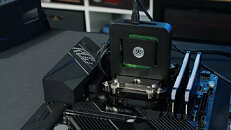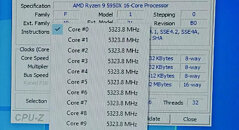
Thermal Grizzly at Computex 2025: Award-Winning Der8auer Bench Table, WireView Pro, and More
Thermal Grizzly at the 2025 Computex showed off its latest products targeted at PC enthusiasts and professional overclockers. The star attraction in this booth is the Der8auer der8enchtable. This piece of hardware is perfection—it's a bench table that doubles up as a PCB. You install your motherboard on top of this with the provided standoffs, and connect your motherboard to this baseboard that takes care of all the other connectivity, including USB, fan control, liquid-cooling pump control, storage devices, lighting control, and other cool stuff. TechPowerUp has given the Thermal Grizzly Der8auer der8enchtable the Best of Computex 2025 Award for innovating something we never knew we badly wanted!
Thermal Grizzly also showed off its latest WireView Pro, a module that lets you keep an eye on the way your graphics card is pulling power, with in-line measurement of voltage, current, connector temperature, and other stats. The latest generation of WireView Pro comes with an IPS LCD replacing the older OLED matrix display, for even more detail. Up next, are several DIY liquid cooling products Thermal Grizzly showed off under its DeltaMate brand, which include the Mycro Pro II AM5 CPU water block, which comes with design-level optimization for Socket AM5 MCMs such as "Raphael" and "Granite Ridge," and the DeltaMate ROG Astral RTX 5090 full-coverage water block.More pictures follow.
Thermal Grizzly also showed off its latest WireView Pro, a module that lets you keep an eye on the way your graphics card is pulling power, with in-line measurement of voltage, current, connector temperature, and other stats. The latest generation of WireView Pro comes with an IPS LCD replacing the older OLED matrix display, for even more detail. Up next, are several DIY liquid cooling products Thermal Grizzly showed off under its DeltaMate brand, which include the Mycro Pro II AM5 CPU water block, which comes with design-level optimization for Socket AM5 MCMs such as "Raphael" and "Granite Ridge," and the DeltaMate ROG Astral RTX 5090 full-coverage water block.More pictures follow.


















































